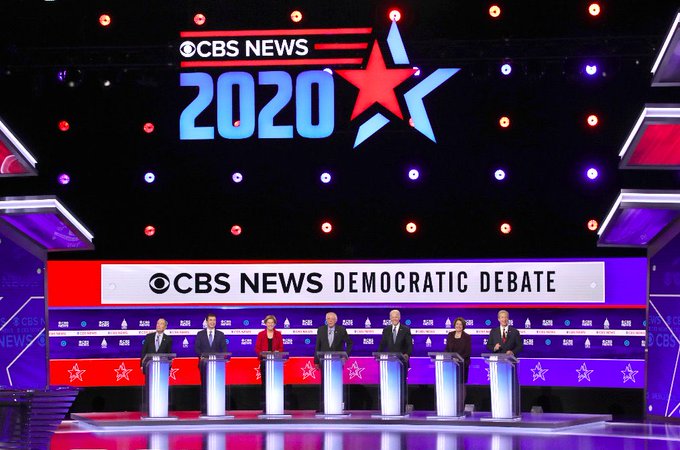Debates Increase Tensions Among Candidates
The end of February saw heightened tension in the contest for the Democratic Party’s nomination for the presidency. The candidates met to debate in Las Vegas and Charleston prior to the Nevada caucuses and South Carolina primary. In both gatherings, sparks flew between the candidates, as a number of factors have considerably shifted the atmosphere of the race.
Perhaps the most notable change in these last two debates was the presence of billionaire and former mayor of New York Michael Bloomberg, and his introduction did not go smoothly, to say the least. In his first of the two debates especially, Bloomberg was challenged on anything and everything. Bernie Sanders and Pete Buttigieg made numerous jabs at his past affiliation with and financial support for Republicans. Former vice president Joe Biden challenged Bloomberg’s claim that the mayor had been proactive in rolling back stop-and-frisk. No doubt the most devastating blows came from Sen. Elizabeth Warren, who on both nights laid bare the most shocking and guttural of Bloomberg’s alleged comments and pressed him on non-disclosure agreements with former employees.
Bloomberg shockingly seemed ill-prepared for these predictable attacks, and, worse yet, often came across as aloof or even arrogant, dismissing some allegations of inappropriate workplace behavior as bad jokes taken poorly. Even in moments which should have been bright spots for him, such as his characterizations of Sanders as too extreme, Bloomberg undercut himself by snidely labeling the Vermont senator as a communist, eliciting groans from both the audience and other candidates on stage. Moreover, Bloomberg’s apparent Freudian slip in Charleston, when he seemingly started by saying that he had “bought” politicians, did nothing to mend the perception of him as an oligarch merely trying to buy another election. While the sheer immensity of his wealth will likely keep him in the fray for as long as he desires, it seems increasingly unlikely that the Democratic base will accept him as their nominee.
As for the person who went on the offensive both nights, Elizabeth Warren delivered strong performances, taking the moderate candidates especially to task. Among her zingers in Nevada, Warren dismissed Amy Klobuchar and Pete Buttigieg’s healthcare plans as belonging on Post-It notes and PowerPoint presentations, respectively. In Charleston, Warren offered some critique of Sanders, asserting that she would be better equipped at passing a progressive agenda through Congress.
In spite of both of these strong showings, Warren has seen no bump in the polls. The reason, I believe, is that she has created something of an identity crisis for herself. In these and past arguments against both progressives and moderates, Warren has seemingly tried to forge a path as a compromise between extremes. Yet in doing so, she seems to have instead alienated both sides, leaving her campaign stagnant.
The increasing hostility between Buttigieg and Klobuchar in Nevada was of obvious note, rooted perhaps in that each wanted to claim the role of the midwestern moderate for themselves. Based on her lines of attack, Klobuchar also seemed to resent Buttigieg’s comparable success despite his lack of experience.
Both Buttigieg and Klobuchar dropped out of the presidential race following the South Carolina primary.
This leg of the race seemed to be a make or break performance for Biden, as hehas fallen dramatically from his frontrunner position following severe underperformances in the first few contests. Both nights saw Biden deliver fairly enlivened debate showings, which, while not particularly memorable, were an improvement upon past debate performances marked by gaffes and stumbles. He needed steady and stable nights, which he achieved. Even more importantly, Biden righted the ship in South Carolina, a state hailed as his stronghold with its large share of older black voters among whom Biden has long received strong support, and he delivered a resounding victory for himself in the primary.
However, the prevailing sentiment behind all this was the ascendancy of Bernie Sanders as the Democratic frontrunner. National polls show the Vermont senator in first place. After having won the popular vote in the Iowa caucuses, the New Hampshire primary and the Nevada caucuses, Sanders has attained a solid position at the head of the pack.
During the South Carolina debate especially, the other candidates went on the attack, once again questioning the practicality of Sanders’ various plans such as Medicare For All, decrying his supposed attraction to Communist regimes and generally painting him as overly divisive. At least for this newest and most prominent line of criticism surrounding comments on Cuba, Sanders dismissed the attacks by correctly pointing out that President Obama had in fact made similarly positive assessments of Cuba’s education and health programs during a visit to the country and in a town hall after. For this and other critiques, though often having to speak over a flurry of crosstalk, Sanders seemed to offer mostly effective rebuttals.
Coming out of these two debates and the contests which followed them, Sanders did not seem damaged enough to topple him from his place as the most likely ultimate victor. That being said, especially after Biden’s more invigorated debate performances and subsequent victory in South Carolina, it is very much premature to declare this process over. With the first five contests decided, it seems increasingly certain that this election will ultimately be one between Biden and Sanders, with one candidate carrying the banner of the Democratic Party’s moderate old guard and the other championing the growing progressive wing of the party.
Kyle Chin, FCRH ’21, is a political science and history major from Malverne, N.Y.








































































































































































































